NTC Pedagogy For Primary And JHS Questions And Answers(Questioning and Feedback)
NTC Pedagogy For Primary And JHS Questions And Answers(Questioning and Feedback)
Questioning and feedback are two essential components of effective teaching that play a crucial role in the learning process. Both techniques are used by educators to engage students, assess their understanding, and provide them with valuable information to improve their learning outcomes. Let’s explore each of them in more detail:
- Questioning: Questioning is the process of asking students a series of thought-provoking questions to stimulate their thinking, encourage active participation, and assess their understanding of the subject matter. Effective questioning can serve several purposes:
NTC Pedagogy For Primary And JHS Questions And Answers(Questioning and Feedback)
NTC Pedagogy For Primary And JHS Questions And Answers(Classroom Management)
NTC Pedagogy For Primary And JHS Questions And Answers (Lesson Planning)
NTC Pedagogy For Primary And JHS Questions And Answers (Inclusion Learning)
NTC Pedagogy For Primary And JHS Questions And Answers (Differentiated And Scaffolding)
NTC Pedagogy For Primary And JHS Questions And Answers (Curriculum)
NTC Pedagogy For Primary And JHS Questions And Answers (Methods Of Teaching Primary And JHS) 1
NTC Pedagogy For Primary And JHS Questions And Answers (Methods Of Teaching Primary And JHS) 2
JOIN OUR WHATSAPP GROUP HERE
a. Encouraging critical thinking: Thoughtful questions can challenge students to think deeply about the topic and analyze it from different perspectives.
b. Assessing prior knowledge: By asking questions at the beginning of a lesson, teachers can gauge what students already know about the topic and tailor their instruction accordingly.
c. Checking for understanding: Throughout the lesson, teachers can ask questions to assess if students are following along and comprehending the material.
d. Promoting class participation: When students are actively involved in answering questions, it enhances their engagement and helps create a dynamic learning environment.
e. Facilitating discussions: Thoughtful questions can lead to meaningful class discussions where students can share their ideas and learn from their peers.
It’s important for teachers to use a variety of question types, such as open-ended questions, closed-ended questions, probing questions, and hypothetical questions, to keep the classroom dynamic and encourage deeper thinking.
- Feedback: Feedback is information given to students about their performance, understanding, or efforts. Effective feedback should be constructive, specific, and focused on helping students improve. There are two main types of feedback:
a. Formative feedback: This type of feedback is provided during the learning process, often informally and frequently. It aims to guide students’ understanding, highlight areas for improvement, and support their ongoing learning. Formative feedback is forward-looking and helps students make progress.
b. Summative feedback: Summative feedback is given after a specific learning task or assessment has been completed. It provides an overall evaluation of students’ performance, indicating their strengths and weaknesses. Summative feedback is typically used to assign grades or evaluate learning outcomes.
NTC Pedagogy For Primary And JHS Questions And Answers(Questioning and Feedback)
NTC Pedagogy For Primary And JHS Questions And Answers(Classroom Management)
NTC Pedagogy For Primary And JHS Questions And Answers (Lesson Planning)
NTC Pedagogy For Primary And JHS Questions And Answers (Inclusion Learning)
NTC Pedagogy For Primary And JHS Questions And Answers (Differentiated And Scaffolding)
NTC Pedagogy For Primary And JHS Questions And Answers (Curriculum)
NTC Pedagogy For Primary And JHS Questions And Answers (Methods Of Teaching Primary And JHS) 1
NTC Pedagogy For Primary And JHS Questions And Answers (Methods Of Teaching Primary And JHS) 2
JOIN OUR WHATSAPP GROUP HERE
Effective feedback should be timely, specific, and actionable. It should focus on the task or learning objective rather than on personal attributes. Teachers can use various feedback methods, including written comments, verbal discussions, peer assessment, and self-assessment, to help students understand their progress and make improvements.
In summary, questioning and feedback are powerful teaching strategies that can enhance student engagement, understanding, and learning outcomes. By asking thought-provoking questions and providing timely and constructive feedback, educators can create a supportive and challenging learning environment that fosters academic growth and development.
NTC Pedagogy For Primary And JHS Questions And Answers(Questioning and Feedback)
NTC Pedagogy For Primary And JHS Questions And Answers(Classroom Management)
NTC Pedagogy For Primary And JHS Questions And Answers (Lesson Planning)
NTC Pedagogy For Primary And JHS Questions And Answers (Inclusion Learning)
NTC Pedagogy For Primary And JHS Questions And Answers (Differentiated And Scaffolding)
NTC Pedagogy For Primary And JHS Questions And Answers (Curriculum)
NTC Pedagogy For Primary And JHS Questions And Answers (Methods Of Teaching Primary And JHS) 1
NTC Pedagogy For Primary And JHS Questions And Answers (Methods Of Teaching Primary And JHS) 2
JOIN OUR WHATSAPP GROUP HERE
- What is the main purpose of questioning in teaching?
A) To assess students’ behavior
B) To stimulate critical thinking
C) To memorize facts
D) To grade students’ performance
Answer: B (To stimulate critical thinking)
2. Which type of question requires students to use their understanding to solve practical problems?
A) Open-Ended Questions
B) Closed-Ended Questions
C) Application Questions
D) Probing Questions
Answer: C (Application Questions)
3. At which level of questioning do students break down information and examine relationships between components?
A) Comprehension
B) Knowledge
C) Analysis
D) Evaluation
Answer: C (Analysis)
4. What type of question is used to prompt students to think beyond what is immediately evident?
A) Closed-Ended Questions
B) Open-Ended Questions
C) Hypothetical Questions
D) Rhetorical Questions
Answer: C (Hypothetical Questions)
5. Which level of questioning in Bloom’s Taxonomy involves creating something new by combining elements?
A) Synthesis
B) Evaluation
C) Comprehension
D) Knowledge
Answer: A (Synthesis)
NTC Pedagogy For Primary And JHS Questions And Answers(Questioning and Feedback)
NTC Pedagogy For Primary And JHS Questions And Answers(Classroom Management)
NTC Pedagogy For Primary And JHS Questions And Answers (Lesson Planning)
NTC Pedagogy For Primary And JHS Questions And Answers (Inclusion Learning)
NTC Pedagogy For Primary And JHS Questions And Answers (Differentiated And Scaffolding)
NTC Pedagogy For Primary And JHS Questions And Answers (Curriculum)
NTC Pedagogy For Primary And JHS Questions And Answers (Methods Of Teaching Primary And JHS) 1
NTC Pedagogy For Primary And JHS Questions And Answers (Methods Of Teaching Primary And JHS) 2
JOIN OUR WHATSAPP GROUP HERE
6. What is the primary difference between open-ended and closed-ended questions?
A) Open-ended questions have specific answers, while closed-ended questions do not.
B) Open-ended questions require critical thinking, while closed-ended questions do not.
C) Closed-ended questions are used for quick assessments, while open-ended questions are not.
D) Closed-ended questions encourage extended responses, while open-ended questions do not.
Answer: B (Open-ended questions require critical thinking, while closed-ended questions do not.)
7. What type of question guides students toward a particular answer or line of thinking?
A) Probing Questions
B) Leading Questions
C) Rhetorical Questions
D) Closed-Ended Questions
Answer: B (Leading Questions)
8. At which level of questioning do students recall factual information or simple concepts?
A) Application
B) Knowledge
C) Synthesis
D) Evaluation
Answer: B (Knowledge)
9. How do probing questions differ from open-ended questions?
A) Probing questions have specific answers, while open-ended questions do not.
B) Probing questions encourage critical thinking, while open-ended questions do not.
C) Probing questions are follow-up questions, while open-ended questions are not.
D) Probing questions are used for quick assessments, while open-ended questions are not.
Answer: C (Probing questions are follow-up questions, while open-ended questions are not.)
NTC Pedagogy For Primary And JHS Questions And Answers(Questioning and Feedback)
NTC Pedagogy For Primary And JHS Questions And Answers(Classroom Management)
NTC Pedagogy For Primary And JHS Questions And Answers (Lesson Planning)
NTC Pedagogy For Primary And JHS Questions And Answers (Inclusion Learning)
NTC Pedagogy For Primary And JHS Questions And Answers (Differentiated And Scaffolding)
NTC Pedagogy For Primary And JHS Questions And Answers (Curriculum)
NTC Pedagogy For Primary And JHS Questions And Answers (Methods Of Teaching Primary And JHS) 1
NTC Pedagogy For Primary And JHS Questions And Answers (Methods Of Teaching Primary And JHS) 2
JOIN OUR WHATSAPP GROUP HERE
10. What type of question requires students to make judgments based on criteria and evidence?
A) Comprehension Questions
B) Evaluation Questions
C) Synthesis Questions
D) Application Questions
Answer: B (Evaluation Questions)
11. Which level of questioning involves understanding the meaning of information and concepts?
A) Application
B) Analysis
C) Comprehension
D) Evaluation
Answer: C (Comprehension)
12. How do wait time questions differ from rhetorical questions?
A) Wait time questions promote critical thinking, while rhetorical questions do not.
B) Rhetorical questions encourage extended responses, while wait time questions do not.
C) Wait time questions allow students to think and respond, while rhetorical questions do not expect answers.
D) Rhetorical questions are used as follow-up questions, while wait time questions are not.
Answer: C (Wait time questions allow students to think and respond, while rhetorical questions do not expect answers.)
13. What type of question is used to assess students’ memory and ability to remember specific information?
A) Hypothetical Questions
B) Closed-Ended Questions
C) Application Questions
D) Recall Questions
Answer: D (Recall Questions)
14. Which level of questioning involves guiding an entire unit or course and promotes exploration and critical thinking?
A) Comprehension
B) Application
C) Essential Questions
D) Knowledge
Answer: C (Essential Questions)
NTC Pedagogy For Primary And JHS Questions And Answers(Questioning and Feedback)
NTC Pedagogy For Primary And JHS Questions And Answers(Classroom Management)
NTC Pedagogy For Primary And JHS Questions And Answers (Lesson Planning)
NTC Pedagogy For Primary And JHS Questions And Answers (Inclusion Learning)
NTC Pedagogy For Primary And JHS Questions And Answers (Differentiated And Scaffolding)
NTC Pedagogy For Primary And JHS Questions And Answers (Curriculum)
NTC Pedagogy For Primary And JHS Questions And Answers (Methods Of Teaching Primary And JHS) 1
NTC Pedagogy For Primary And JHS Questions And Answers (Methods Of Teaching Primary And JHS) 2
JOIN OUR WHATSAPP GROUP HERE
15. How can teachers use open-ended questions effectively in the classroom?
A) To assess basic understanding
B) To stimulate critical thinking and encourage extended responses
C) To guide students toward a particular answer
D) To quickly check for comprehension
Answer: B (To stimulate critical thinking and encourage extended responses)
16. What is the main purpose of feedback in teaching?
A) To grade students’ performance
B) To assess students’ behavior
C) To provide information for improvement
D) To stimulate critical thinking
Answer: C (To provide information for improvement)
17. At which level of questioning do students apply their knowledge to solve real-world problems?
A) Analysis
B) Synthesis
C) Application
D) Evaluation
Answer: C (Application)
18. What is the primary purpose of rhetorical questions?
A) To promote critical thinking
B) To encourage extended responses
C) To create emphasis or make a point
D) To guide students toward a particular answer
Answer: C (To create emphasis or make a point)
NTC Pedagogy For Primary And JHS Questions And Answers(Questioning and Feedback)
NTC Pedagogy For Primary And JHS Questions And Answers(Classroom Management)
NTC Pedagogy For Primary And JHS Questions And Answers (Lesson Planning)
NTC Pedagogy For Primary And JHS Questions And Answers (Inclusion Learning)
NTC Pedagogy For Primary And JHS Questions And Answers (Differentiated And Scaffolding)
NTC Pedagogy For Primary And JHS Questions And Answers (Curriculum)
NTC Pedagogy For Primary And JHS Questions And Answers (Methods Of Teaching Primary And JHS) 1
NTC Pedagogy For Primary And JHS Questions And Answers (Methods Of Teaching Primary And JHS) 2
JOIN OUR WHATSAPP GROUP HERE
19. What type of question is used to assess students’ understanding of the meaning of information?
A) Comprehension Questions
B) Open-Ended Questions
C) Application Questions
D) Closed-Ended Questions
Answer: A (Comprehension Questions)
20. How can teachers use probing questions effectively in the classroom?
A) To guide students toward a particular answer
B) To assess basic understanding
C) To encourage critical thinking and provide more details
D) To stimulate creativity
Answer: C (To encourage critical thinking and provide more details)
21. Which type of question is used to prompt students to think beyond what is immediately evident?
A) Closed-Ended Questions
B) Hypothetical Questions
C) Rhetorical Questions
D) Open-Ended Questions
Answer: B (Hypothetical Questions)
NTC Pedagogy For Primary And JHS Questions And Answers(Questioning and Feedback)
NTC Pedagogy For Primary And JHS Questions And Answers(Classroom Management)
NTC Pedagogy For Primary And JHS Questions And Answers (Lesson Planning)
NTC Pedagogy For Primary And JHS Questions And Answers (Inclusion Learning)
NTC Pedagogy For Primary And JHS Questions And Answers (Differentiated And Scaffolding)
NTC Pedagogy For Primary And JHS Questions And Answers (Curriculum)
NTC Pedagogy For Primary And JHS Questions And Answers (Methods Of Teaching Primary And JHS) 1
NTC Pedagogy For Primary And JHS Questions And Answers (Methods Of Teaching Primary And JHS) 2
JOIN OUR WHATSAPP GROUP HERE
22. What distinguishes Analysis level questions from Comprehension level questions?
A) Analysis questions require recalling factual information, while Comprehension questions do not.
B) Analysis questions involve combining elements to create something new, while Comprehension questions focus on understanding.
C) Analysis questions require understanding the meaning of information, while Comprehension questions examine relationships between components.
D) Analysis questions involve critical thinking, while Comprehension questions require recalling facts.
Answer: C (Analysis questions require understanding the meaning of information, while Comprehension questions examine relationships between components.)
23. How do wait time questions differ from essential questions?
A) Wait time questions guide the entire unit, while essential questions are follow-up questions.
B) Wait time questions promote exploration and critical thinking, while essential questions are used for quick assessments.
C) Wait time questions allow students to think and respond, while essential questions require specific answers.
D) Wait time questions involve rhetorical elements, while essential questions do not.
Answer: B (Wait time questions promote exploration and critical thinking, while essential questions are used for quick assessments.)
NTC Pedagogy For Primary And JHS Questions And Answers(Questioning and Feedback)
NTC Pedagogy For Primary And JHS Questions And Answers(Classroom Management)
NTC Pedagogy For Primary And JHS Questions And Answers (Lesson Planning)
NTC Pedagogy For Primary And JHS Questions And Answers (Inclusion Learning)
NTC Pedagogy For Primary And JHS Questions And Answers (Differentiated And Scaffolding)
NTC Pedagogy For Primary And JHS Questions And Answers (Curriculum)
NTC Pedagogy For Primary And JHS Questions And Answers (Methods Of Teaching Primary And JHS) 1
NTC Pedagogy For Primary And JHS Questions And Answers (Methods Of Teaching Primary And JHS) 2
JOIN OUR WHATSAPP GROUP HERE
24. What type of question requires students to make judgments based on criteria and evidence?
A) Comprehension Questions
B) Evaluation Questions
C) Synthesis Questions
D) Application Questions
Answer: B (Evaluation Questions)
25. What is the primary difference between open-ended and closed-ended questions?
A) Open-ended questions require critical thinking, while closed-ended questions do not.
B) Open-ended questions encourage extended responses, while closed-ended questions do not.
C) Closed-ended questions are used for quick assessments, while open-ended questions are not.
D) Closed-ended questions encourage extended responses, while open-ended questions do not.
Answer: A (Open-ended questions require critical thinking, while closed-ended questions do not.)
27. What is the main purpose of questioning?
a) Enhancing creativity
b) Promoting critical thinking
c) Exchanging ideas
d) Memorizing information
Answer: b) Promoting critical thinking
NTC Pedagogy For Primary And JHS Questions And Answers(Questioning and Feedback)
NTC Pedagogy For Primary And JHS Questions And Answers(Classroom Management)
NTC Pedagogy For Primary And JHS Questions And Answers (Lesson Planning)
NTC Pedagogy For Primary And JHS Questions And Answers (Inclusion Learning)
NTC Pedagogy For Primary And JHS Questions And Answers (Differentiated And Scaffolding)
NTC Pedagogy For Primary And JHS Questions And Answers (Curriculum)
NTC Pedagogy For Primary And JHS Questions And Answers (Methods Of Teaching Primary And JHS) 1
NTC Pedagogy For Primary And JHS Questions And Answers (Methods Of Teaching Primary And JHS) 2
JOIN OUR WHATSAPP GROUP HERE
28. How does questioning contribute to personal growth?
a) By providing immediate answers
b) By fostering self-reflection
c) By encouraging conformity
d) By avoiding challenges
Answer: b) By fostering self-reflection
29. How do open-ended questions differ from closed-ended questions?
a) Open-ended questions have only one correct answer.
b) Closed-ended questions encourage detailed responses.
c) Open-ended questions limit the respondent’s options.
d) Closed-ended questions have multiple possible answers.
Answer: d) Closed-ended questions have multiple possible answers.
30. Which type of question is designed to gauge the respondent’s feelings or experiences?
a) Probing questions
b) Reflective questions
c) Scaling questions
d) Leading questions
Answer: b) Reflective questions
31. What is the primary purpose of using funnel questions?
a) To guide the conversation systematically
b) To challenge the respondent’s assumptions
c) To lead the respondent to a specific answer
d) To evaluate the effectiveness of a marketing campaign
Answer: a) To guide the conversation systematically
NTC Pedagogy For Primary And JHS Questions And Answers(Questioning and Feedback)
NTC Pedagogy For Primary And JHS Questions And Answers(Classroom Management)
NTC Pedagogy For Primary And JHS Questions And Answers (Lesson Planning)
NTC Pedagogy For Primary And JHS Questions And Answers (Inclusion Learning)
NTC Pedagogy For Primary And JHS Questions And Answers (Differentiated And Scaffolding)
NTC Pedagogy For Primary And JHS Questions And Answers (Curriculum)
NTC Pedagogy For Primary And JHS Questions And Answers (Methods Of Teaching Primary And JHS) 1
NTC Pedagogy For Primary And JHS Questions And Answers (Methods Of Teaching Primary And JHS) 2
JOIN OUR WHATSAPP GROUP HERE
32. When should leading questions be used?
a) Frequently, as they encourage creativity
b) Sparingly, to avoid influencing the response
c) Only in educational settings
d) Only when dealing with complex issues
Answer: b) Sparingly, to avoid influencing the response
33. “What is the boiling point of water?” This is an example of which level of questioning?
a) Lower-Order (Knowledge)
b) Higher-Order (Synthesis)
c) Meta-cognitive (Reflection)
Answer: a) Lower-Order (Knowledge)
34. “Can you analyze the main factors that contributed to the company’s success?” This is an example of which level of questioning?
a) Lower-Order (Comprehension)
b) Higher-Order (Analysis)
c) Meta-cognitive (Critical Thinking)
Answer: b) Higher-Order (Analysis)
35. “Why do you think the protagonist made that decision in the story?” This is an example of which level of questioning?
a) Lower-Order (Application)
b) Higher-Order (Evaluation)
c) Meta-cognitive (Self-awareness)
Answer: a) Lower-Order (Application)
36. What is one significant benefit of effective questioning?
a) Providing immediate answers
b) Encouraging conformity
c) Enhancing creativity
d) Promoting critical thinking
Answer: d) Promoting critical thinking
NTC Pedagogy For Primary And JHS Questions And Answers(Questioning and Feedback)
NTC Pedagogy For Primary And JHS Questions And Answers(Classroom Management)
NTC Pedagogy For Primary And JHS Questions And Answers (Lesson Planning)
NTC Pedagogy For Primary And JHS Questions And Answers (Inclusion Learning)
NTC Pedagogy For Primary And JHS Questions And Answers (Differentiated And Scaffolding)
NTC Pedagogy For Primary And JHS Questions And Answers (Curriculum)
NTC Pedagogy For Primary And JHS Questions And Answers (Methods Of Teaching Primary And JHS) 1
NTC Pedagogy For Primary And JHS Questions And Answers (Methods Of Teaching Primary And JHS) 2
JOIN OUR WHATSAPP GROUP HERE
37. How does feedback contribute to personal growth and improvement?
a) By discouraging individuals from trying new things
b) By praising every action, regardless of its quality
c) By identifying areas for improvement and providing guidance
d) By avoiding any discussion of weaknesses
Answer: c) By identifying areas for improvement and providing guidance
38. What is the primary purpose of feedback in communication?
a) To reinforce good performance
b) To discourage any form of criticism
c) To set unrealistic expectations
d) To hinder growth and development
Answer: a) To reinforce good performance
39. What is the primary purpose of questioning?
a) Enhancing creativity
b) Promoting critical thinking
c) Exchanging ideas
d) Memorizing information
Answer: b) Promoting critical thinking
40. How does questioning contribute to personal growth?
a) By providing immediate answers
b) By fostering self-reflection
c) By encouraging conformity
d) By avoiding challenges
Answer: b) By fostering self-reflection
NTC Pedagogy For Primary And JHS Questions And Answers(Questioning and Feedback)
NTC Pedagogy For Primary And JHS Questions And Answers(Classroom Management)
NTC Pedagogy For Primary And JHS Questions And Answers (Lesson Planning)
NTC Pedagogy For Primary And JHS Questions And Answers (Inclusion Learning)
NTC Pedagogy For Primary And JHS Questions And Answers (Differentiated And Scaffolding)
NTC Pedagogy For Primary And JHS Questions And Answers (Curriculum)
NTC Pedagogy For Primary And JHS Questions And Answers (Methods Of Teaching Primary And JHS) 1
NTC Pedagogy For Primary And JHS Questions And Answers (Methods Of Teaching Primary And JHS) 2
JOIN OUR WHATSAPP GROUP HERE
41. How do open-ended questions differ from closed-ended questions?
a) Open-ended questions have only one correct answer.
b) Closed-ended questions encourage detailed responses.
c) Open-ended questions limit the respondent’s options.
d) Closed-ended questions have multiple possible answers.
Answer: d) Closed-ended questions have multiple possible answers.
42. What is the significance of using probing questions?
a) To guide the conversation systematically
b) To gauge the respondent’s feelings or experiences
c) To lead the respondent to a specific answer
d) To evaluate the effectiveness of a marketing campaign
Answer: b) To gauge the respondent’s feelings or experiences
43. How should leading questions be used?
a) Frequently, as they encourage creativity
b) Sparingly, to avoid influencing the response
c) Only in educational settings
d) Only when dealing with complex issues
Answer: b) Sparingly, to avoid influencing the response
44. How do reflective questions contribute to personal development?
a) By discouraging self-reflection
b) By reinforcing existing beliefs
c) By promoting empathy
d) By fostering self-awareness
Answer: d) By fostering self-awareness
45. What is one benefit of using open-ended questions in a group discussion?
a) Encouraging conformity
b) Limiting participants’ contributions
c) Promoting active engagement
d) Decreasing the duration of the discussion
Answer: c) Promoting active engagement
46. How do funnel questions guide the conversation?
a) By encouraging creative thinking
b) By leading the respondent to a specific answer
c) By limiting the scope of the discussion
d) By starting broad and gradually becoming more specific
Answer: d) By starting broad and gradually becoming more specific
NTC Pedagogy For Primary And JHS Questions And Answers(Questioning and Feedback)
NTC Pedagogy For Primary And JHS Questions And Answers(Classroom Management)
NTC Pedagogy For Primary And JHS Questions And Answers (Lesson Planning)
NTC Pedagogy For Primary And JHS Questions And Answers (Inclusion Learning)
NTC Pedagogy For Primary And JHS Questions And Answers (Differentiated And Scaffolding)
NTC Pedagogy For Primary And JHS Questions And Answers (Curriculum)
NTC Pedagogy For Primary And JHS Questions And Answers (Methods Of Teaching Primary And JHS) 1
NTC Pedagogy For Primary And JHS Questions And Answers (Methods Of Teaching Primary And JHS) 2
JOIN OUR WHATSAPP GROUP HERE
47. When are closed-ended questions most useful?
a) When exploring complex issues
b) When seeking detailed responses
c) When encouraging creative thinking
d) When promoting critical thinking
Answer: b) When seeking detailed responses
48. How can effective questioning contribute to knowledge acquisition?
a) By providing immediate answers
b) By promoting critical thinking and exploration
c) By encouraging conformity and memorization
d) By avoiding challenges and complex topics
Answer: b) By promoting critical thinking and exploration
49. What type of questions encourage detailed responses and provide more information?
a) Probing questions
b) Reflective questions
c) Closed-ended questions
d) Leading questions
Answer: a) Probing questions
50. When should reflective questions be used?
a) To guide the conversation systematically
b) To challenge the respondent’s assumptions
c) To encourage self-awareness and reflection
d) To evaluate the effectiveness of a marketing campaign
Answer: c) To encourage self-awareness and reflection
NTC Pedagogy For Primary And JHS Questions And Answers(Questioning and Feedback)
NTC Pedagogy For Primary And JHS Questions And Answers(Classroom Management)
NTC Pedagogy For Primary And JHS Questions And Answers (Lesson Planning)
NTC Pedagogy For Primary And JHS Questions And Answers (Inclusion Learning)
NTC Pedagogy For Primary And JHS Questions And Answers (Differentiated And Scaffolding)
NTC Pedagogy For Primary And JHS Questions And Answers (Curriculum)
NTC Pedagogy For Primary And JHS Questions And Answers (Methods Of Teaching Primary And JHS) 1
NTC Pedagogy For Primary And JHS Questions And Answers (Methods Of Teaching Primary And JHS) 2
JOIN OUR WHATSAPP GROUP HERE
51. What is the primary purpose of using funnel questions?
a) To encourage creative thinking
b) To guide the conversation systematically
c) To lead the respondent to a specific answer
d) To evaluate the effectiveness of a marketing campaign
Answer: b) To guide the conversation systematically
52. What is the significance of using open-ended questions in a group discussion?
a) Encouraging conformity
b) Limiting participants’ contributions
c) Promoting active engagement
d) Decreasing the duration of the discussion
Answer: c) Promoting active engagement
53. How can leading questions be used effectively?
a) By asking them frequently to stimulate creative thinking
b) By avoiding their use to prevent bias
c) By leading the respondent to a predetermined answer
d) By using them to encourage self-awareness
Answer: b) By avoiding their use to prevent bias
54. When are closed-ended questions most useful?
a) When exploring complex issues
b) When seeking detailed responses
c) When encouraging creative thinking
d) When promoting critical thinking
Answer: b) When seeking detailed responses
55. Which type of question is designed to gauge the respondent’s feelings or experiences?
a) Probing questions
b) Reflective questions
c) Scaling questions
d) Leading questions
Answer: b) Reflective questions
NTC Pedagogy For Primary And JHS Questions And Answers(Questioning and Feedback)
NTC Pedagogy For Primary And JHS Questions And Answers(Classroom Management)
NTC Pedagogy For Primary And JHS Questions And Answers (Lesson Planning)
NTC Pedagogy For Primary And JHS Questions And Answers (Inclusion Learning)
NTC Pedagogy For Primary And JHS Questions And Answers (Differentiated And Scaffolding)
NTC Pedagogy For Primary And JHS Questions And Answers (Curriculum)
NTC Pedagogy For Primary And JHS Questions And Answers (Methods Of Teaching Primary And JHS) 1
NTC Pedagogy For Primary And JHS Questions And Answers (Methods Of Teaching Primary And JHS) 2
JOIN OUR WHATSAPP GROUP HERE
56. What is the primary purpose of feedback in communication?
a) To reinforce good performance
b) To discourage any form of criticism
c) To set unrealistic expectations
d) To hinder growth and development
Answer: a) To reinforce good performance
57. How does feedback contribute to personal growth and improvement?
a) By discouraging individuals from trying new things
b) By praising every action, regardless of its quality
c) By identifying areas for improvement and providing guidance
d) By avoiding any discussion of weaknesses
Answer: c) By identifying areas for improvement and providing guidance
58. How do reflective questions contribute to personal development?
a) By discouraging self-reflection
b) By reinforcing existing beliefs
c) By promoting empathy
d) By fostering self-awareness
Answer: d) By fostering self-awareness
NTC Pedagogy For Primary And JHS Questions And Answers(Questioning and Feedback)
NTC Pedagogy For Primary And JHS Questions And Answers(Classroom Management)
NTC Pedagogy For Primary And JHS Questions And Answers (Lesson Planning)
NTC Pedagogy For Primary And JHS Questions And Answers (Inclusion Learning)
NTC Pedagogy For Primary And JHS Questions And Answers (Differentiated And Scaffolding)
NTC Pedagogy For Primary And JHS Questions And Answers (Curriculum)
NTC Pedagogy For Primary And JHS Questions And Answers (Methods Of Teaching Primary And JHS) 1
NTC Pedagogy For Primary And JHS Questions And Answers (Methods Of Teaching Primary And JHS) 2
JOIN OUR WHATSAPP GROUP HERE
Related Searches
Questions and answers Discuss the various levels of questioning NTC GTLE Content Areas questions and answers, NTC Past Question On Pedagogy Of Primary And JHS
Questions and answers Explain the types of questioning NTC GTLE Content Areas questions and answers, NTC Past Question On Pedagogy Of Primary And JHS
Questions and answers List the relevance of questioning. NTC GTLE Content Areas questions and answers, NTC Past Question On Pedagogy Of Primary And JHS
Questions and answers Illustrate effective questioning strategies. NTC GTLE Content Areas questions and answers, NTC Past Question On Pedagogy Of Primary And JHS
Questions and answers Develop some examples of questioning relating to the levels of questioning. NTC GTLE Content Areas questions and answers, NTC Past Question On Pedagogy Of Primary And JHS
Questions and answers Elaborate the importance of feedback NTC GTLE Content Areas questions and answers, NTC Past Question On Pedagogy Of Primary And JHS
NTC Pedagogy For Primary And JHS Questions And Answers(Questioning and Feedback)
NTC Pedagogy For Primary And JHS Questions And Answers(Classroom Management)
NTC Pedagogy For Primary And JHS Questions And Answers (Lesson Planning)
NTC Pedagogy For Primary And JHS Questions And Answers (Inclusion Learning)
NTC Pedagogy For Primary And JHS Questions And Answers (Differentiated And Scaffolding)
NTC Pedagogy For Primary And JHS Questions And Answers (Curriculum)
NTC Pedagogy For Primary And JHS Questions And Answers (Methods Of Teaching Primary And JHS) 1
NTC Pedagogy For Primary And JHS Questions And Answers (Methods Of Teaching Primary And JHS) 2
JOIN OUR WHATSAPP GROUP HERE

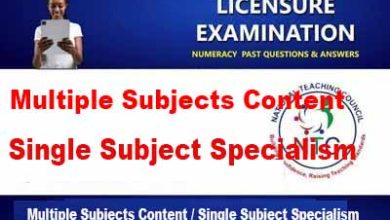
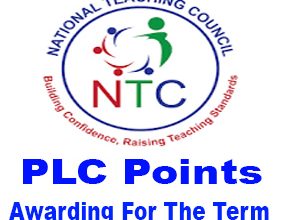
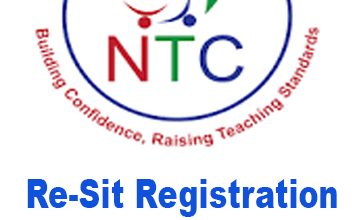
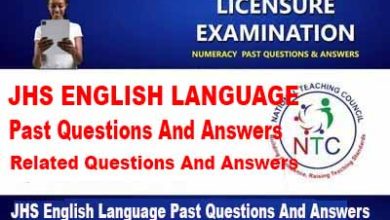
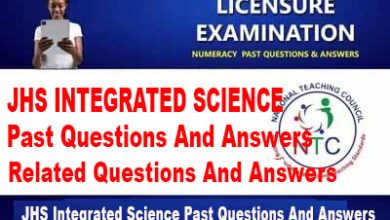
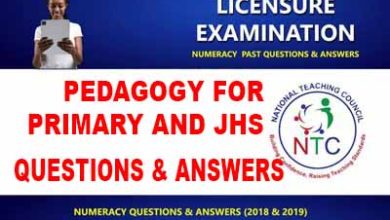
One Comment